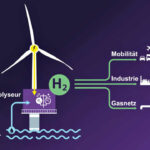Schleswig-Holstein
Dr Bernd Buchholz Minister for Economics, Transport, Labour, Technology and Tourism Schleswig-Holstein“Although there is now a broad consensus that the restructuring of the energy system will not succeed without hydrogen, the federal government is lacking the decisive impetus to really move the issue forward. That is why we have now decided not to wait any longer for the federal government, but to move forward as coastal states. “
Schleswig-Holstein borders geographically on Denmark, Mecklenburg-Western Pomerania, Hamburg and Lower Saxony and lies between the Baltic Sea and the North Sea. Schleswig-Holstein has about 2.9 million inhabitants on an area of 15,800 square kilometres.
Due to its geographical location, wind energy plays a major role. Currently, wind turbines with a capacity of about 6.7 gigawatts on land and about 1.8 gigawatts offshore are connected to the Schleswig-Holstein electricity grid. Together with photovoltaics and biomass, more than ten gigawatts of capacity are installed. An expansion of onshore wind turbines to ten gigawatts is planned by 2025. In 2017, the share of renewable energies in Schleswig-Hol-stein was 156.5 percent of the state’s gross electricity consumption.
Numerous medium-sized companies and plant producers have settled in Schleswig-Holstein to offer products and services for a successful energy transition. Thematic focal points are currently sector coupling, the integration of new technologies into the energy system, e.g. green hydrogen and synthetic fuels, electromobility, the digitalisation of the energy sector, energy efficiency and energy storage.
Various federally funded projects on sector coupling and hydrogen use demonstrate the innovative capacity of companies in Schleswig-Holstein. This was most recently confirmed by the successful application of projects from Schleswig-Holstein in the ideas competition “Reallabore der Energiewende”. The state’s universities and scientific research institutions contribute to the success of the energy transition with their scientific expertise.
The Ministry of Education, Science and Culture (MBWK), the Ministry of Energy Transition, Agriculture, Environment, Nature and Digitalisation (MELUND) and the Ministry of Economics, Transport, Labour, Technology and Tourism (MWVATT) want to better network the diverse research activities in order to contribute to Schleswig-Holstein’s stronger scientific profile in the field of energy transition research. The common goal is to achieve high-performance energy transition research in Schleswig-Holstein that is recognised beyond the region and makes substantial contributions to climate protection, the further development of the energy transition and the strengthening of Schleswig-Holstein as a location for business and science.
Within the framework of Schleswig-Holstein’s energy transition research, solutions are to be developed that provide answers to the concrete challenges facing society as a whole in a European networked energy transition. At the same time, options for the use of renewable energies with added value and jobs in Schleswig-Holstein are to be identified. Isolated solutions are not being sought – rather, the individual projects are to be systemically integrated into a cross-sectoral energy transition.



